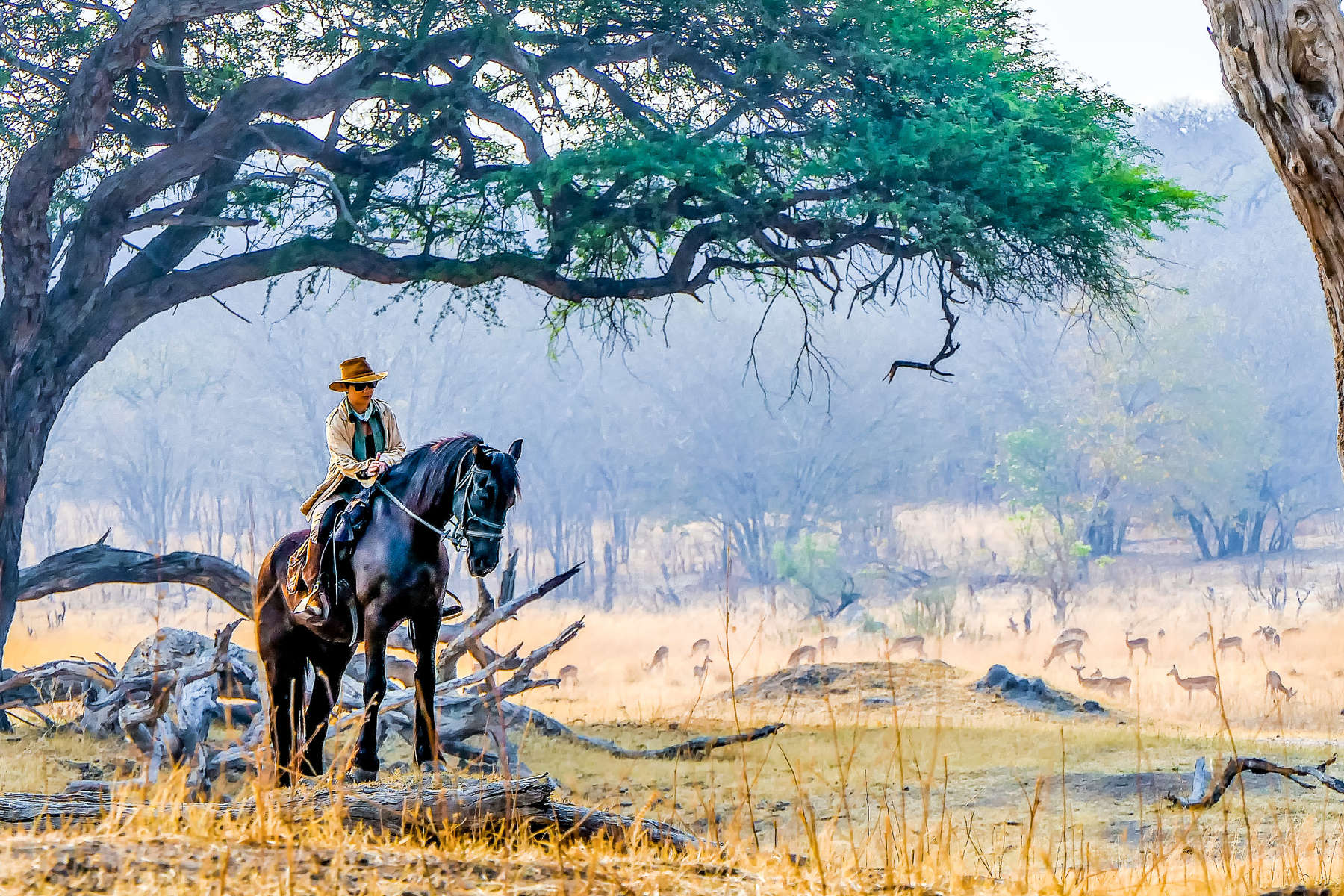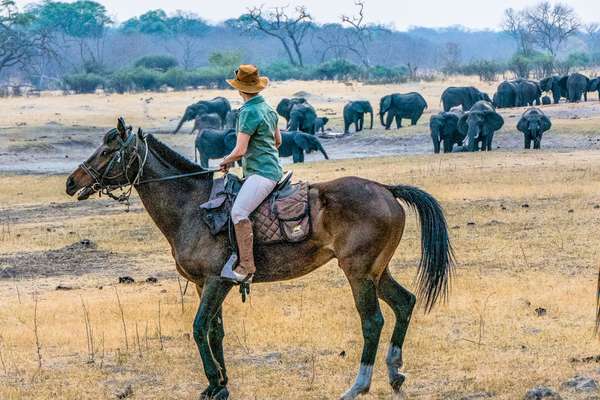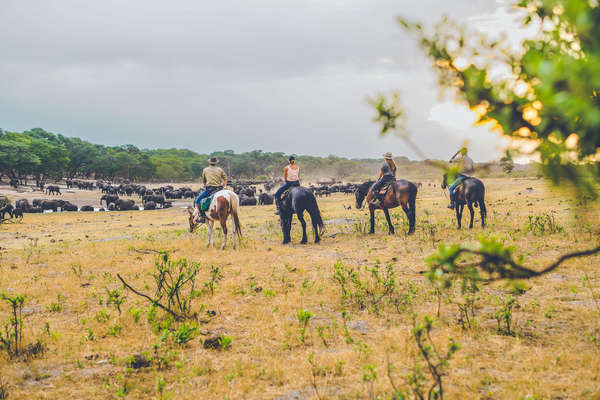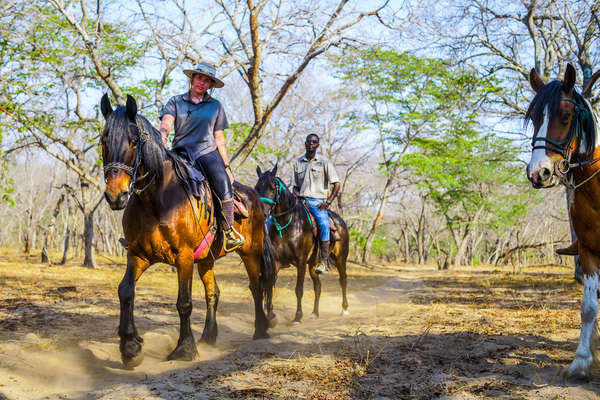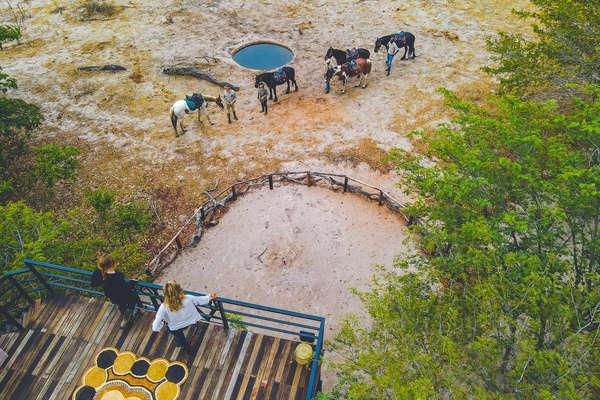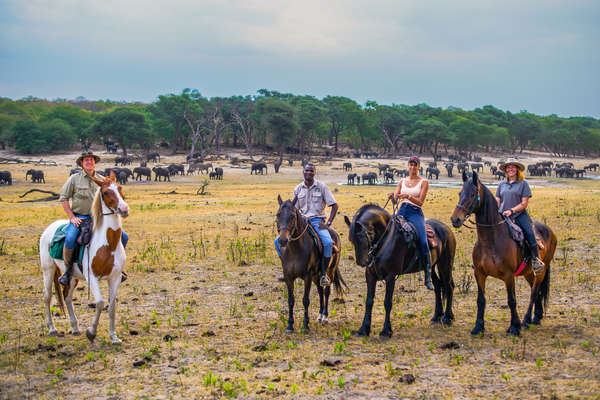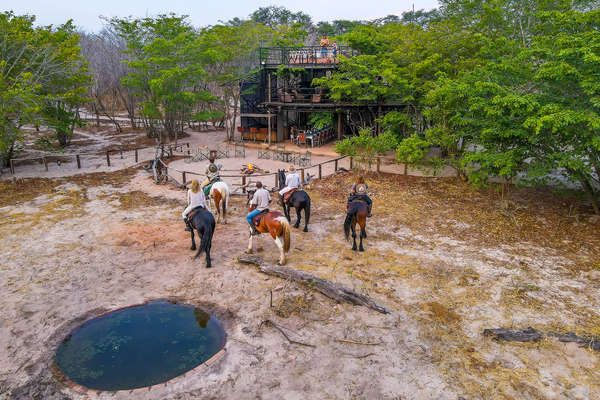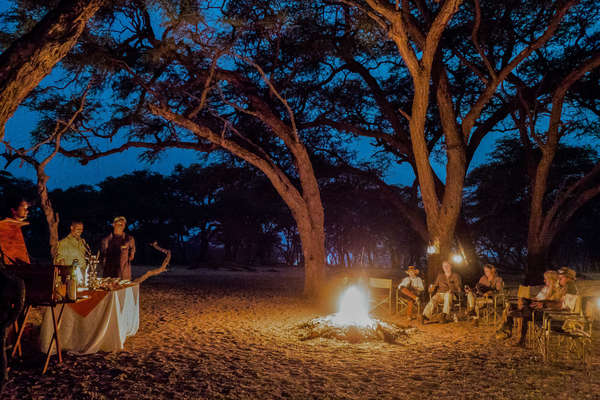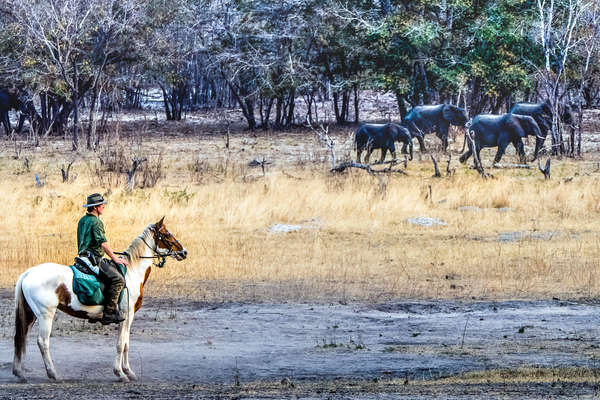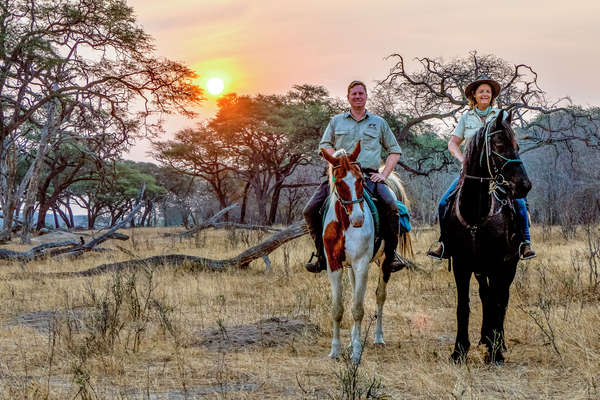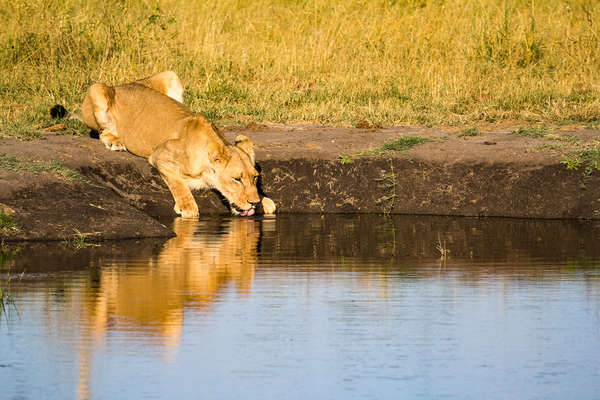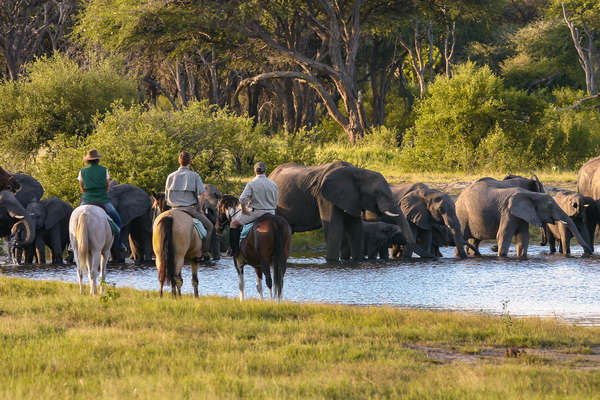Comfort
Accommodation is provided in traditional safari tents. On the first two and last nights guests are accommodated at Iganyana Wild Camp. Four nights of this riding safari are spent in a mobile camp, moved according to the game movement (it is possible that camp will not move at all depending on local conditions).
Mobile camp: safari tents with camp beds and mattresses, all en-suite. Full bedding is provided. Dry toilet and bush shower. There is no electricity at camp, please make sure to bring spare batteries or portable solar charger. As Hwange is home to a healthy lion population, security is provided by a working electric fence surrounding camp at night. Important: depending on the local conditions, it is possible the camp will not move around as often as initially planned. Your guides will make their decisions with your best interests in mind.
Iganyana Wild Camp: a small, intimate camp. All tents are en-suite with flush toilets and hot showers. No electricity in the rooms but charging facilities are available in the main area.
Limited Wi-Fi is available at Iganyana (5 min walk from main camp) - no reception inside the park.
Laundry can be done at both Iganyana and the bush mobile camps so no need for very extensive wardrobes.
There is 220V AC electricity provided by solar and generator at Iganyana but not on the mobile section. Charging of gadgets and cameras will be through a 12V DC vehicle inverter or accessory plug. Iganyana has both 16Amp round pin South African plug sockets, and multi-socket adaptors for UK, European and USA plugs. There are also standard USB ports in the main living area of Iganyana. There will be a small swimming pool for those lovely hot summer mid-days.
Meals
Breakfast includes eggs, bacon, toast and sausage.
Lunch includes cold meat, salad, tomato, cucumber and cheese.
Dinner will consist of meat, vegetables and rice/potato/pasta.
All drinks are included in your package including soft drinks, gin, vodka, scotch, local beers and South African wines. Premium or imported drinks are not included.
Special diets (vegetarian, food allergies) must be notified at the time of your booking. Special meals cannot be guaranteed if you only inform us shortly before the trip.
Climate
PLEASE NOTE: Chances of rain are highest in December and January therefore riding is according to the weather conditions. Wildlife sightings will be minimal during this period as well.
November and December:
The summer months are warmer and wetter with continuous rains or thunderstorms in the afternoon ending before the safari starts. Mosquitoes and other insects are also more present during this time of the year compared to the winter months of June, July and August (seasons are in reverse in the Southern Hemisphere).
From January to March:
These months are normally drier with very hot days. Mosquitoes and other insects are more present at this time of the year than in the winter months.
Chances of rain are highest in December and January therefore riding is according to the weather conditions. Wildlife sightings will be minimal during this period as well.
April:
The vegetation begins to change, the green bush becomes sparse and brown during this period of autumn. Temperatures drop during the night but it is still warm during the day with possible thunderstorms in the afternoon.
May to June:
Temperatures are low during the night and early in the morning during the winter months. The vegetation becomes brown and the trees lose their leaves. Visibility is increased by sparse vegetation.
From July to September:
This period is very dry in the bush, with very cold nights, it is also cool during the morning and late afternoon excursions.
From October to November:
Spring is the peak of the dry season with warm winds and sparse vegetation. The first rains arrive at the end of the month
Tips
These are not compulsory but appreciated. If you wish to give a gratuity please give the total to the senior member of staff in the presence of the other staff members. The staff has its own resolution on gratuity disbursement.
Packing list
When you go on a horseback safari, it is best to wear clothes of a neutral colour (green, brown, beige or grey) that will blend in to the countryside. Please note that this list is a recommendation only and should be adapted depending on the season. If in doubt, please contact your adviser.
Head
- A riding helmet is mandatory and you must take your own. Helmet makers (GPA, HKM, LAS Helmets, Lamicell, Troxel, Equithème) now offer horse-riding helmets that are ventilated, strong, light and comfortable. You also have the option of buying protective shells to go under your hats (Ranch & Rider, Lexington Safety Products) or western hat helmets (Troxel).
- Sunhat for lunch break and game drives
- Sunglasses - with a cord attached so they don't fly off when riding
- Buff or bandana for protecting your neck and face from the sun, wind or rain
Upper body
- Polo shirts or long-sleeved shirts (to protect against the sun)
- 1 or 2 long-sleeved shirts for the evening
- 1 lightweight fleece or jumper (from September to June)
- 1 warm fleece or jumper (from May to September during the winter)
- 1 lightweight or warm waterproof jacket (depending on the season). It is always a good idea to wear a coat with a multitude of pockets to keep your cameras, snacks, other items in.
Legs
- 2 pairs of lightweight, comfortable riding trousers or jodhpurs in cotton with either mini or long chaps in leather or other synthetic materials - this will help to protect you against the long vegetation. We recommend riding in them at home before taking them on holiday to ensure they don't rub
- Casual clothes for the evenings (jeans or walking trousers)
- Non-irritant cotton or synthetic underwear
Hands and Feet
- Comfortable riding boots. We recommend short boots with half-chaps. We don't recommend taking your favourite leather boots in case they get damaged
- Lightweight shoes or trainers for the evenings
- Several pairs of warm socks
- Gloves - your hands are particularly exposed to the sun, wind or rain whilst riding
Our Recommendations
- Backpacks cannot be worn whilst riding. We recommend a small bumbag or a coat with pockets so that you can carry small items with you during the day (camera - see below, lip balm etc)
- For your cameras, we strongly recommend keeping them in a dust-proof pouch, that can be attached to you whilst riding. It should be easily accessible and not take more than 2 seconds to take out of the pouch. Keeping your camera in your saddle bag is not ideal as by the time you have extracted the camera, you can be sure that whatever you wanted to take a picture of will have moved away!
- Sunscreen can be carried in saddlebags
- A soothing cream may be useful to treat areas irritated by long hours in the saddle
Photos & Extras
- We recommend bringing a camera with a zoom capacity of 200 or 300 mm to take photos of the animals on the plains and large panorama images of the countryside
- Bring a change of batteries. We recommend you bring a change of batteries and multiple memory cards
- A pair of binoculars can come in handy
- Before taking a photo of a person, you must always ask permission of the people concerned. You must consider the feelings/ opinions/ respect due to the possible subjects of your photos
-Throughout the world, and particularly in Africa, it is forbidden to take photos on or of administrative or military installations
Other useful items
- Travel bag 70-100 litres (hold luggage)
- Travel bag 25-30 litres (cabin bag)
- Water bottle (1.5 litres or 2 equivalent)
- Headtorch or small torch for moving around at night - bring spare batteries and bulbs
- Toiletries
- Swiss army knife or equivalent (in checked-in luggage!!)
- Small plastic bags for your rubbish
- Ear plugs (may be useful)
Medical kit
Make sure any allergies (to medication or otherwise) and clearly stated in your medical kit
- Any medication you regularly take
- Anti-malaria pills
- Painkillers
- Imodium or similar anti-diarrhea medication
- Vitamin C tablets
- Sunscreen and lip balm - should be high factor
- Insect repellent
- Eye drops
- Hydrating/ soothing cream
- Plasters
- Blister plasters in case of any rubs
- Antiseptic cream, plasters, aspirin, anti-histamine, insect-bite salve etc..
- 10cm wide bandage
- Spare prescription glasses/contact lenses
- Re-hydration sachets
- Antiseptic wipes
- Handwash gel
In your hold luggage
- Any liquids, such as shampoo, moisturiser, deodorant over 100 ml and all bottles can be decanted into small, clear, plastic Ziplock bags. We recommend biodegradable washing products where possible.
- We recommend taking a copy of your passport and insurance documents with you in case you lose your originals
- In your hand luggage carry any valuables, such as your camera, ipod, ipad etc.
- If you wish to travel 'light' and wash your clothes throughout the ride, please bring with you laundry detergent that is biodegradable
- All waste that could be considered toxic (batteries, aerosols, batteries, empty cream tubes, film) needs to be kept with you and transported back to the UK, where recycling is done well and efficiently. Avoid, wherever possible, to bring with you unnecessary packaging

